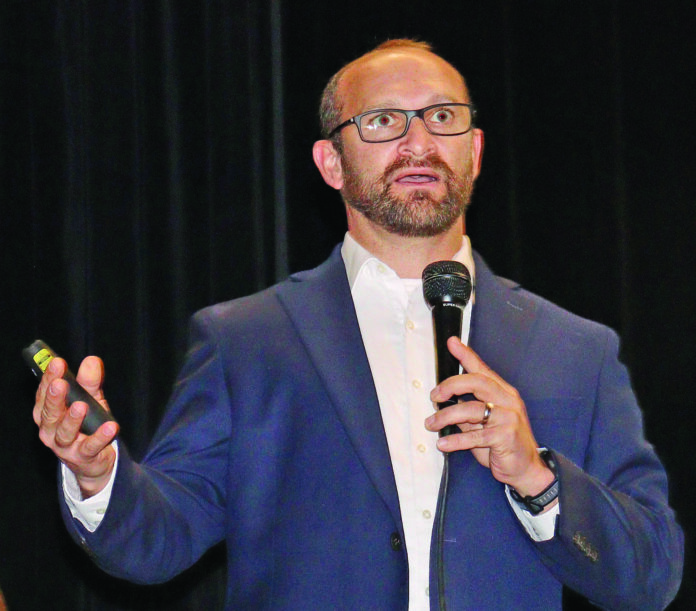
by David Hill
Editor
Residents of small communities may not give much thought to economic development, but it’s important to the present and future economic well-being and quality of life for every citizen living in the community.
Matt Marshall, member services, rates and economic development manager of Minnkota Power Cooperative, was the guest speaker at the Manufacturers’ Luncheon in Thief River Falls on Thursday, Oct.31. Minnkota Power Cooperative may be an unlikely source for the importance of economic development, but Marshall pointed out that one of the cooperative’s core principles is concern for community. What says it cares more for the community, he asked, than making sure everyone is growing and thriving? Economic growth and development is good for the cooperative, and for the communities it serves.
(Minnkota also serves as operating agent for the Northern Municipal Power Agency (NMPA). Headquartered in Thief River Falls, NMPA supplies the electric needs of 12 associated municipals that serve more than 15,000 consumer accounts in the same geographic area as the Minnkota member-owners.)
Marshall stressed that it’s important for every community to have a strategic plan for economic growth and development.
Communities and leaders can and should turn for assistance to numerous organizations and agencies involved in economic development – the state, regional economic development groups, local economic developers and many other partners, such as chambers of commerce, and small business centers.
Economic development and growth and strategic plans should be of concern to everyone because no community is guaranteed that a company will continue to grow or stay in any one community. In today’s market, manufacturers can pick up and leave, and in fact, are actively, and frequently, courted by competing interests, even by state and community organizations.
Healthy manufacturers are also important to communities for the tax income they generate for communities. These tax revenues come from the companies, and employees, and they help fund many public services, such as schools, roads, medical facilities, parks and libraries. Without these taxes, local leaders have to turn to other taxpayers for more financial support.
What role do local citizens and leaders play in economic development? Marshall noted that economic development activities don’t thrive in a vacuum. It requires many partners and strong leaders. Strong local leaders help manufacturers, help drive change, and impact policy development at state and local levels. They also foster development by navigating social, economic and political structures.
Marshall said an investment in manufacturers doesn’t create winners and losers, it creates opportunities for growth and development that benefit everyone. Any grant or assistance to a manufacturer is an investment in the community and its future.
As an example of the point he was making, Marshall pointed out that there are approximately 1,048 manufacturing jobs in Thief River Falls. It’s estimated, said Marshall, that the direct impact of these jobs on the community is about $1 million.
Marshall said a number of these employees come from outside the community. This is strategically important because it attracts other workers to the community. Marshall stressed however that studies have shown that it’s important to have multiple employment options for individuals coming into the community.
Some of the takeaways from the presentation include:
• Communities sometimes overlook the importance of supporting manufacturer growth when budgets are tight. It is possible to grow out of budget issues.
• Economic development is an investment in a community.
• Keeping revenue in a community is important to attracting new investments.
• Nothing happens overnight. Economic and community development activity are long-term efforts that require persistent creativity but which can bring great rewards.
• Communities are in a global fight for talent, and business investment and everyone has a part to play to helping their community grow and thrive.
Who was there?
Between 20 to 30 area business leaders attended the luncheon. Thief River Falls Mayor Brian Holmer said it’s important to work with local manufacturers to navigate political and economic issues. He said manufacturers don’t want a hand out but a hand up. Dr. Shari Olson, interim president of Northland Community and Technical College, reminded visitors of her long past service to the college and community, and said that Northland is ready to be their partner. In the past, the college has made great use of job training grants that benefit local businesses and the community.
The luncheon was made possible by donations from several local businesses, and support from the Thief River Falls Chamber of Commerce, Northland Community and Technical College, the Minnesota Department of Economic Development and Advance Thief River.
